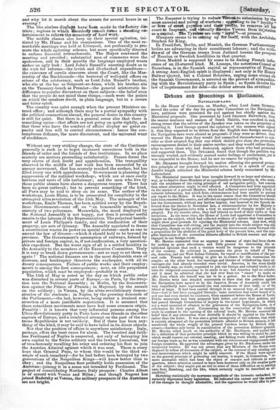Without any very striking change, the state of the Continent
generally is such as to beget increased uneasiness both in the friends of order and the friends of free institutions. In no place scarcely are matters proceeding satisfactorily. France forms the very centre of dark doubt and apprehension. The tranquillity observed in the middle of last week has been succeeded by an uneasy movement, that has scarcely reached the surface, but has filled every one with apprehension. Government is planning the suppression of the national workshops, which are at once costly burdens and nests of idle turbulence ; and the men who live by those public abuses have shown a dangerous temper. There has been no great outbreak ; but to prevent something of the kind, all Paris may be said to sleep on its arms. The author of the workshops, Louis Blanc, is to be prosecuted for complicity in the attempted ultra revolution of the 15th May. The manager of the workshops, Emile Thomas, has been spirited away by the Repub- lican Government—sent off, on " an honourable mission," in custody of two policemen. Meanwhile, the mood displayed by the National Assembly is not happy, nor does it promise useful results to the labours of the Representatives. The perpetual banish- ment of Louis Philippe's family, and the confiscation of their property, are acts of tyranny. The Assembly appointed to frame a constitution wastes its power on special statutes—such as one to amend the law of divorce—which it should hold to be beyond its province. The Government's assumption of railways, formed by private and foreign capital, is, if not confiscation, a very question- able expedient. But the worst sign of all is a settled hostility in the Assembly to the members of the Executive Committee. Truly it is easy to break down governments—not so easy to set them up again ! The national finances are in the most deplorable state of decrease, and bankruptcy threatens the exchequer, with all its dreary consequences. Failure of public works and their employ- ments is among the first consequences; next, an idle pauperized population, which must be employed—probably in war. The 15th of May is noted as the day on which public order was disturbed in several parts of Europe, in Paris, by the irrup- tion into the National Assembly ; in Berlin, by the demonstra- tion against the Prince of Prussia ; in Mayence, by the assault on the soldiery ; in Vienna, by the ultra-revolutionary demon- stration of the students ; in Naples, by the growing demands of the Parliament,—the last, however, being rather a strained con- struction of a more justifiable negotiation. It is assumed that these coincident movements must have had some common origin. Possibly : it is known that very influential persons among the Ultra-Revolutionary party in Paris have close friends in the other capitals of Europe, and a combined attempt on the part of the ex- treme Republicans is not unlikely. But if there has been any- thing of the kind, it may be said to have failed in its direct objects.
Not that the position of affairs is anywhere satisfactory. Italy, perhaps, offers the least cause for alarm. The besotted and faith- less Ferdinand of Naples is suspected, not only of betraying his own capital to the Swiss soldiery and the lawless Lazzaroni, but of treacherously recalling his army and ordering his fleet to join the Austrian Admiral against which it was sent. There is every hope that General Pepe, to whom this would be the third ex- ample of such treachery—for he had before been betrayed by two generations of the Neapolitan Kings—will know better than to obey ; and the Neapolitan fleet probably holds possession of the Austrian—joining it in a sense not intended by Ferdinand. The project of consolidating Northern Italy prospers : Charles Albert is of accord with Venice and Milan ; and though Nugent has joined Radetzky at Verona, the military prospects of the Austrians are not bright. The Emperor is trying to reduce Vienna to submission by the most unusual and paltry of warfares : appealing to its " loyalty n or love of court gayeties and their profits, he removes all lie court to Insprmik, and virtually diarates Vienna from itieetatissi as 41 capital. The Tyrolese are very " loyal "--at present.
Hungary seems to be setting up for itself, with the Archduke Stephen for King.
In Frankfort, Berlin, and Munich, the German Parliamentary bodies are advancing in their constituent labours ; and the with, drawal of the German troops from Jutland lessens the prospect of Russian or Swedish hostilities in that quarter.
Even Madrid is supposed by some to be feeling French influ- ences of an ill-starred kind. M. Lesseps, the notorious Consul of Bareelona, is in the Spanish capital as representative of Frame. A strong Anti-English spirit is displayed : not only is Sir Henry Bulwer ejected, but a Colonel Bristowe, urging some claims on the Spanish Government, is arrested on the pretext of sympathia. ing with the Revolutionary party in Spain ; so Spain inverts the law of imprisonment for debt—the debtor arrests the creditor!


























 Previous page
Previous page